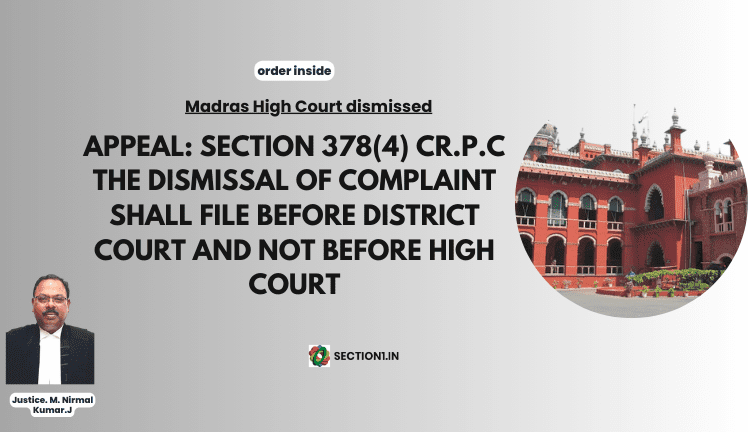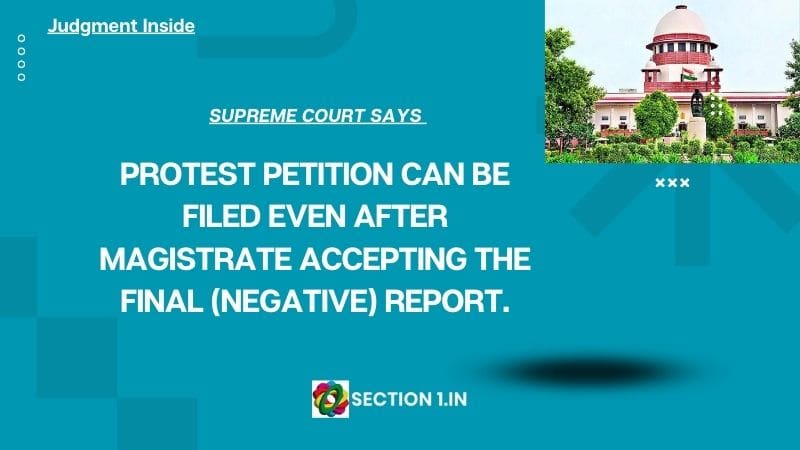Present appeal against the order of High court setting aside the order discharging the accused under section 227 crpc
The appellants have taken exception to the judgment and order dated 20th December 2018 passed by the learned Single Judge of the High Court of Judicature at Madras. The learned Additional District and Sessions Judge, Salem, had passed an order dated 9th January 2009 granting discharge to the appellants in the exercise of powers under Section 227 of the Code of Criminal Procedure, 1973 (for short ‘CrPC’). One Nanjundan, the husband of the deceased Siddammal, challenged the order of the learned Additional District and Sessions Judge by filing a revision application. The High Court, by the impugned judgment and order, has allowed the revision application and has remanded the case to the learned Additional District and Sessions Judge for holding trial. The said Nanjundan died during the pendency of revision application. The respondent is his son.
Factual aspects
2. We must advert to a few factual aspects. The respondent’s father Nanjundan had lodged a First Information Report bearing Cr. No.107 of 2004 (the FIR) alleging the commission of offences under Sections 341, 323 and 302 of the Indian Penal Code against the appellants. The FIR was based on the incident of 9th October 2004. In the complaint, based on which the FIR was registered, it was alleged that the first appellant had filed a suit against the respondent, praying for carrying out the measurement of the property claimed by the appellants and removing encroachment. On the date of the incident, around 11 am, the appellants and one Gopal assembled in front of the respondent’s house, along with village munsif and a surveyor. They informed the respondent’s father that Gopal had purchased the said property from the first appellant, and they wanted to measure the property. The respondent’s mother (the deceased) tried to prevent them from entering to carry out a survey. The allegation is that at that time, the first appellant exhorted the second appellant to kill the deceased. Thereupon, the second appellant picked up a stick lying at the site and assaulted her on the chest. After that, the third and first appellant kicked the deceased on her chest and stomach. The respondent’s mother was declared dead in the hospital where she was taken.
Based on negative report the respondent’s father instead of filing protest petition has filed a complaint under section 200 cr.p.c
3. After completing the investigation, the investigating officer submitted a final report recording that the death of the deceased was due to natural cause and due to prior enmity, the respondent falsely implicated the appellants. The final report was accordingly, filed on 22nd December 2004. Instead of filing a protest petition, the respondent’s father filed a complaint under Section 200 of CrPC containing the same averments made in his complaint based on which the FIR was registered. The Judicial Magistrate recorded evidence of witnesses, including a doctor who performed a post-mortem. The doctor deposed that the death was natural.
4. As stated earlier, the appellants invoked Section 227 of CrPC for discharge, which was allowed by order dated 9th January, 2009.
Order dismissed the complaint under section 203 crpc by the magistrate and the same was set aside by the High court
7. Perusal of the impugned judgment shows that the High Court was of the view that the learned Additional District and Sessions Judge had conducted a mini-trial. We may note here that initially, the learned Judicial Magistrate had dismissed the complaint by exercising the power under Section 203 of CrPC on the ground that the death was not proved to be homicidal. The High Court, in a petition filed by the respondent’s father, interfered and, by judgment and order dated 18th September 2007, set aside the order of the learned Magistrate. We find from a copy of the said judgment and order that the same was passed without a notice being issued to the present appellants.
Accused properly discharged by the sessions judge under section 227 crpc
8. After having perused the order of the learned Additional District and Sessions Judge dated 9th January 2009, we find that a mini-trial was not conducted. The Court has considered the case within four corners of its limited jurisdiction under Section 227 of the CrPC.
The expert witness examined by the respondent stated (proceeding before magistrate on complaint) that the death was natural
10. Thus, the expert witness examined by the respondent, who admittedly carried out a post-mortem on the body of the deceased, has categorically stated that the death of the deceased was natural. This is coupled with the fact that there were no external injuries found on the body of the deceased.
According to the complainant there was an enmity between him and the accused
11. The version of the respondent’s father who was examined as PW-1 is that one of the appellants hit the deceased with a stick on her chest, and the other appellant repeatedly kicked her on her chest. In the post-mortem, no injury was found on the chest or any other part of the body of the deceased. Therefore, taking the evidence of the respondent’s father and other witnesses as it is, there was no material to proceed against the appellants in the private complaint filed by the respondent’s father. We may also note here that even according to the case of the respondent’s father, there was a dispute between him and the appellants over the property, and the incident occurred when, as per the order of the Civil Court, an attempt was made to survey the property through a government surveyor.
conclusion
12. The High Court, even after referring to the post-mortem certificate, has completely ignored the doctor’s evidence. Hence, the impugned judgment and order cannot be sustained, and the same is set aside. The Judgment and order dated 9th January 2009 in Crl. Misc. Petition No.51 of 2008 in Sessions Case no. 270 of 2008 is restored.
Parties
Ramalingam & Ors vs. N. Viswanathan – CRIMINAL APPEAL NO. 212 OF 2024 – January 18, 2024 – 2024 INSC 45
https://main.sci.gov.in/supremecourt/2019/34839/34839_2019_6_1501_49494_Judgement_18-Jan-2024.pdf
Ramalingam vs. N.Viswanathan – 34839_2019_6_1501_49494_Judgement_18-Jan-2024
Further study
P.C act – special judge – discharge shall be u/s 227 cr.p.c and not u/s 239 cr.p.c
Discharge application cannot be filed after the trial starts
Whether Criminal case against police officer can be filed without sanction obtained u/s 197 Cr.P.C?






